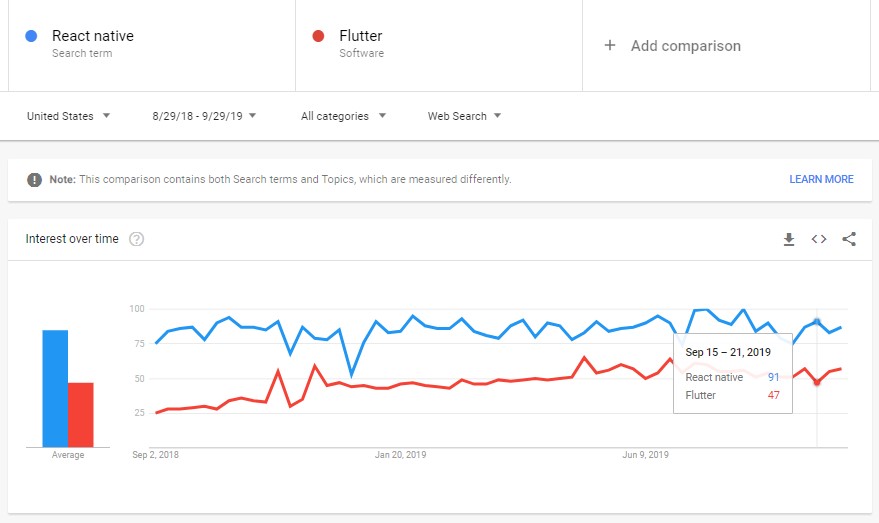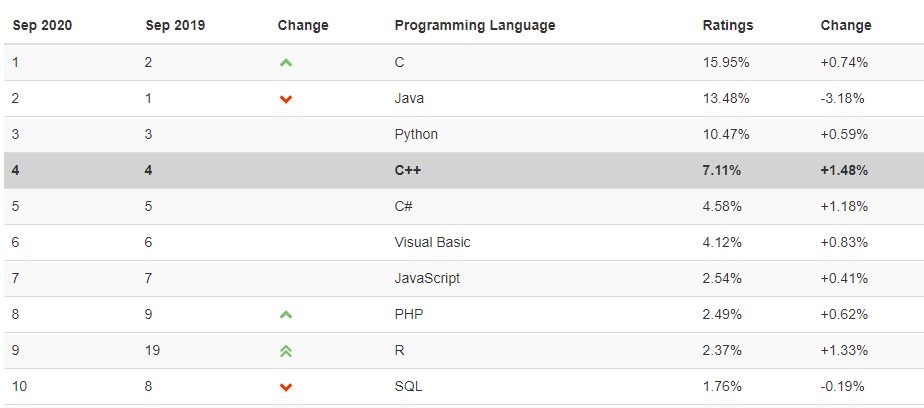Hello 🙏 Readers,
If you are not familiar with it already, React Native is one of the most reliable and popular frameworks lauded by developers around the world. It is the JavaScript library combining native developments with React.
Its subtle attributes like the fact that it is developed by Facebook, is open-source, and easily accessible are what boosted its unprecedented fame.
This framework plays a crucial role in web development and mobile app development for Android and iOS. Developers use it to create User Interface of Web apps with a single page.
Upon analyzing the interest in React Native in 2020, we found that it is more popular than other competing frameworks such as Flutter (as shown in the graph below).

In retrospect, even upon comparing both preferable frameworks for last year, we can see that React Native was still more popular than Flutter.

Now, there has to be a reason or two for why React has been bagging all the attention while leaving crumbs for other frameworks, right?
Some even say React Native for Android and mobile app development will be the future of it. Let’s see whether these speculations have some base to them or are just fluff talk.
So, here are a few reasons why React Native will become a ruling aspect in app development.
Reasons: React Native App Development Is The Future 700
1- Incredible UI designing
As mentioned above, developers use React native for UI development. The reason behind this is React Native allows the development with the CSS-like stylesheets. Why? Because it makes it highly easier to mark the components borders, margins, weight, height, fonts, colors, and everything in between.
Unlike React Native, there are other frameworks of JavaScript as well that have been in the game for long, namely, Angular JS, and Meteor JS. Nevertheless, these frameworks did not provide the things optimally for UI, something which React fulfills. Hence, instead of a framework, it is thought of more like a JS library.
2- Offers dynamic experience
What we mean by dynamic is that it makes everything streamlined and manageable for developers. App development is a complex process as it is, so to facilitate developers for expedite development of the product, React Native offers a positive experience and an efficient development environment.
Developers can easily modify the code in real-time and see the ripple effect of the changes made. This entirely removes the ‘restart again’ step, which usually developers dread while making changes.
Moreover, not only can you generate React Native app layout with flexbox (similar to Android, iOS, and web) but the framework also allows you to embed Chrome developer tools in itself.
So, irrespective of your current code, you can easily add React Native components to an existing app, which saves a lot of time.
3- Learning curve – Easy as a pie
One thing that makes this framework easier to learn for professionals and even beginners is the fact that it operates on language fundamentals. Meaning, the syntax used in it reads more like language which is readable and easily comprehensible.
Plus, since Javascript is already highly popular and if you have learned it, it will become even easier for you to learn React Native. It proves itself as a learning tool to hone components of the likes of maps and filters.
For learned professionals, this may not be something out of the blue, but it offers great features like efficiency in terms of time and money.
4- Instant live updates and Hot Reload
React Native’s hot reload feature is hard to miss. This feature shows changes made to the code in real-time allowing developers to see the mistakes then and there and correct instantly to avoid any blunders.
Moreover, because it uses JavaScript, users can directly release updates without going to app stores for the same. It provides needed tools for this task as well, making the process simple.
5- Reusable code
Even the most enthusiastic and best mobile app developers are not fond of the idea of coding the same things for different products. Redundancy is best kept far. So, to make the development process a little easier and a lot faster, developers tend to gravitate towards React Native.
Why? Because it allows the same code to be used for different platforms like Android and iOS. Hence, it targets multiple platforms with the same code instead of writing codes in different languages for each platform separately.
6- Programming Language it uses
Undoubtedly, JavaScript is one of the widely used programming languages to date. It gives solid competition to Java and C++.
From what it looks like, JavaScript is here to stay for a long time. Thus, it only makes sense to learn React Native now because it is definitely going to gain even more popularity as JavaScripts continues to climb up the charts.

7- Compatibility with third-party plug-ins
Nothing is better than a hybrid app performing remarkably like a native app. With some of the fundamental attributes of cross-platform, React Native allows the code reuse for the same app for multiple platforms and still gives a native-like performance.
It is because it supports third-party plugins and integrates them well. It allows more flexibility for the developers to experiment with different functionalities.
8- Significantly shortens the development cycle
If your app requires a faster time-to-market, then React Native is your way to go. In fact, it is one of the ‘deal-sealers’ for businesses to opt for development. React Native not just offers a remarkable development environment but also reduces the rebuilding tasks.
It uses the layout engines for the platforms and shortens the development time. You can find many components to use with the framework. All that is required is the knowledge of a layout engine for app development.
Limitations of React Native
Yes, React is not free from flaws, yet. Here are some letdowns that developers cannot wait to do away with.
1- Does not support native elements.
Although React does an amazing job when it comes to third-party integration, it lacks much-needed connection with the native elements such as camera, recorder, to name a few. The same case is with the native APIs.
Of course, there are alternatives available out there, but let’s be honest, native app development features are unbeatable, at least as of now. With every latest release React just gets better which is reason enough to believe it will improve in this regard as well.
Will React Native Become That Prevalent ?
From everything that we discussed above, it is safe to conjecture that as Facebook keeps on updating its React Native’s new versions, it will get better and make up for what it now lacks.
And in the coming future, bestowed with improvements, it has the potential to take the mobile app development world by storm.
If you want mobile app business plan with example read our latest blog on it.

Awesome blog for react native.
That’s nice blog to give quick overview about react.
I find the blog is very helpful for React native.
A great piece that sheds much-needed light on Ionic App Development Company and its impact on business as there are many new details you posted here. Sometimes it is not so easy to build an “Ionic App Development Company” without custom knowledge; here you need proper development skills and experience. However, the details you mention here would be very much helpful for the beginner.
A great piece that sheds much-needed light on emerging technology like React Native App Development and its impact on business as there are many new details you posted here. Sometimes it is not so easy to build a Top React native App without custom knowledge; here you need proper development skills and experience. However, the details you mention here would be very much helpful for the beginner.
A great piece that sheds much-needed light on Cross-Platform App development Company and its impact on business as there are many new details you posted here. Sometimes it is not so easy to build a “Cross-Platform App development Company” without custom knowledge; here you need proper development skills and experience. However, the details you mention here would be very much helpful for the beginner.